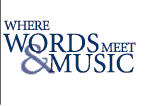


Programme Notes
Canti amori
June 3, 2003
Programme notes by Andrea Budgey
Composers:
Seymour Barab (text by Sir John Suckling): Lovers
Karl Heinz Füssl (text by Ovid & Ptronius): Cantiunculae Amoris
John Plant (text by Sapo): Invocation to Aphrodite
Roger Quilter (text by Robert Herrick): To Julia
Ronald Royer (text by William Shakespeare): Love's Labour
A concert of love-songs on a June evening ought, perhaps, to require no further introduction, but there are connections among the works on this evening’s programme which transcend their subject-matter. One, Ronald Royer’s Love’s Labour, is a commissioned work, while the other four are relatively unknown works of considerable interest and merit, testifying to the Talisker Players’ commitment to enlarging our acquaintance with the repertoire of mixed vocal and instrumental chamber music.
The programme is also unified by a retrospective element: in each case, the composer has set texts by a poet or poets of an earlier age (with three works using texts from the 17th century and two drawing on classical antiquity), paying homage to the lyric tradition of the poets’ periods without in any way creating a musical pastiche. The compositions thus serve to bridge centuries, bringing to light the varieties and affinities of human experiences of love throughout history.
Seymour Barab (1921- ): Lovers
Text by Sir John Suckling
for soprano, clarinet, viola, cello, and piano
The American composer Seymour Barab is known primarily for his more than 30 short operas - such as Chanticleer, A Game of Chance, Little Red Riding Hood and The Toy Shop - many of them for young or amateur performers. He also enjoyed a twenty-year career as a professional orchestral cellist and viola da gamba player, with a particular interest in early music. Lovers, a suite of seven songs on texts by the Cavalier poet Sir John Suckling (1609-1642), blends a 17th-century style of text-setting reminiscent of the works of Thomas Morley, which Barab knew well as a viol-player, with a more contemporary instrumental idiom and tonal vocabulary. The smooth accompanying lines and blended instrumental colours provide an ideal foil for the poetry, which is artful and clever without being insincere.
Karl Heinz Füssl (1924-1992): Cantiunculae amoris
Text by Ovid and Petronius
for tenor and string quartet
Füssl was an Austrian composer, teacher, music critic, and musicologist, whose creative and original writing was informed by a lifetime of the detailed study of the works of earlier composers: he edited works by Haydn, Mozart, J.C. Bach, and Gustav Mahler, among others. His extensive compositional output includes a substantial body of vocal music, including several operas, of which Dybuk (1970) is the best known; his style combines the 12-tone techniques of Schoenberg and Webern with a more straightforwardly tonal lyricism. The Cantiunculae amoris set three elegant and allusively erotic Latin texts, two by Ovid and one by Petronius. The declamatory, almost recitative-like character of much of the vocal line creates a faintly archaic, 18th-century flavour which underlines the stylised playfulness of the antique texts. The work was premiered in Vienna in 1976; tonight’s performance is its North American premiere.
John Plant (1945-): Invocation to Aphrodite
Text by Sappho
for soprano, string quartet, and piano
Resident in Canada since 1968, John Plant studied composition with Bruce Mather and Charles Palmer at McGill University; he has also pursued intensive studies in classics, language, and comparative literature, and his musical works reflect this passionate interest in language and the human voice. Invocation to Aphrodite is a setting of the only substantial piece by the ancient Greek poet Sappho to survive in its complete form. The composer says, "I have tried to capture something of the subtle texture of sound, rhythm, and image in this poem, written in the delicately irresistible Sapphic metre; I also hope to convey Sappho’s sense of a shimmering, many-layered reality, and thus to pay homage to the presence and richness of Aphrodite in our own lives”.
Roger Quilter (1877-1953): To Julia
Text by Robert Herrick
for tenor, string quartet, and piano
This quintessentially English composer of art song first came to prominence at the age of 23, when his Songs of the Sea were premiered in London; the cycle To Julia was first performed five years later, in 1905, by Gervase Elwes, accompanied by the composer. It sets six love lyrics by the Cavalier poet Robert Herrick, with an instrumental prelude and interlude. The text-setting is fluid and sensitive, following the delicate rhythms of the poems, and presenting each song as a small jewel of lightly-worn sensuality. He later made an instrumental arrangement of the piano accompaniment, and it is this rarely-heard version that is performed tonight. Quilter’s later life was plagued by physical and psychological distresses of various kinds, but he was a supporter of younger musicians and in the 1930s helped to finance the escape of Austrian Jews from the Nazis. His dramatic works never achieved much public acclaim, in part because they fell between genres of opera and musical comedy, but his songs - wistfully lyrical with colourful chromatic harmonies - were extremely successful during his lifetime.
Ronald Royer (1959-): Love’s Labour, a Romance
Text by William Shakespeare
for soprano, tenor, clarinet, and string quartet
Like the first composer on this evening’s programme, Ronald Royer is a busy professional cellist, as well as a conductor and teacher. He has composed for a wide variety of orchestral, choral, and chamber ensembles, and his original and accessible works have been performed throughout Canada and the United States, as well as in Germany and the Czech Republic. Love’s Labour was commissioned by the Talisker Players for this evening’s concert: it sets texts from three of Shakespeare’s comedies, with a sonnet epilogue. The composer writes:
Love’s Labour is built around a mini-operatic setting (3rd movement) of a scene from The Taming of the Shrew in which Katharina and Petruchio first meet… surrounded by songs which provide introduction, comment, and resolution… The music is based on the tension and contrast of its various elements: the age-old battle of the sexes; the playful wit of the language versus the intense psychological maneuvering of the characters; and the contemporary resonance of the texts set against the sound of Elizabethan English. Musically, I have tried to underscore these elements by incorporating and contrasting a variety of stylistic and musical techniques, including those from the Renaissance, the Romantic period, Impressionism, and the present.
The composition of Love’s Labour was made possible by a grant from the Laidlaw Foundation. It is dedicated to the Talisker Players.